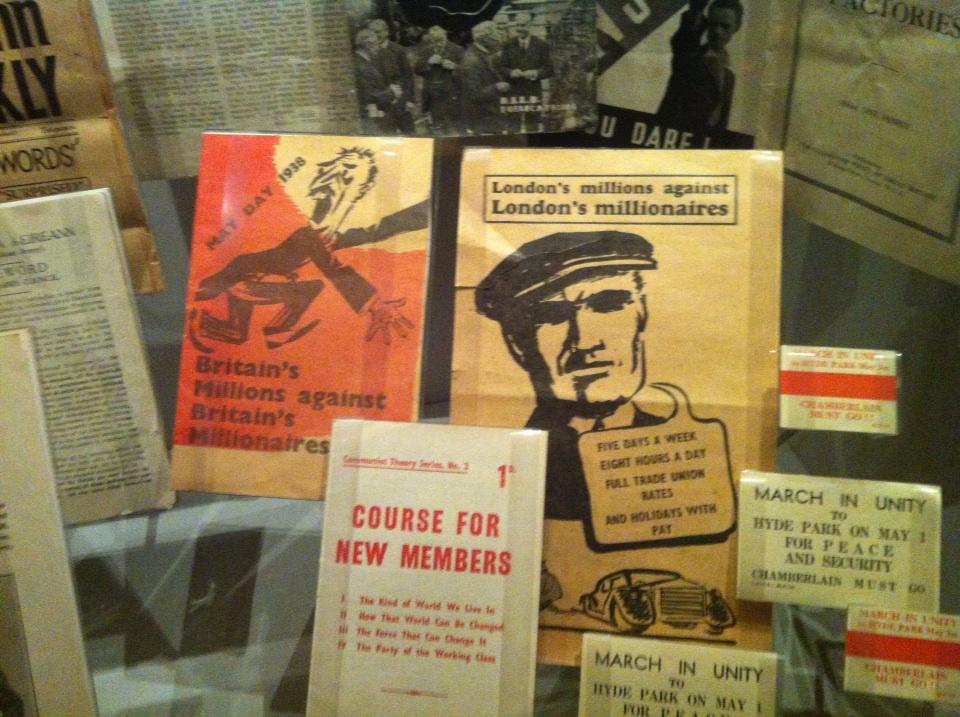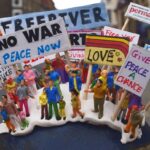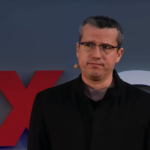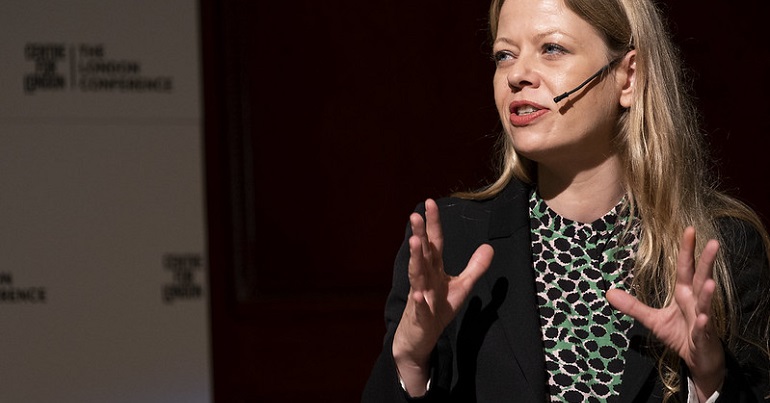How we deny our bloody history – a review of the Imperial War Museum
The stories we tell ourselves define who we are. With this in mind, on Friday, I visited the Imperial War Museum. I am practically pacifist, and certainly anti-imperialist. So I expected to leave angry. But what I found there still managed to blow my mind: a depressing indictment of the British national failure to come to terms with our history. But let me start at the start.
You arrive into a large atrium, allowing a glimpse of each of the floors above. Overlooking them all: “the Lord Ashcroft gallery” – “He who controls the present…”. From then on, it was hard to see the museum as anything but an attempt to shape a distopian future.
The atrium is littered with military hardware: mostly from World War Two, and leads to various exhibitions: one on civilian life in WW2; one on “the secret war” – largely focussing on WW2, a Holocaust exhibition, a collection of WW2 photos by anti-semite Cecil Beaton; a series of WW2 portraits, some recorded interviews with soliders serving in Afghanistan and a film on crimes against humanity.
In the Secret War section, one exhibit in particular stands out. It lumps together groups who M15 saw as a threat in the run up to WW2: the fascists – and from left wing groups calling for “five days a week, eight hours a day, full trade union rights, and holidays without pay”. The Museum chose to entitle them, together: “the menace from right and left”. The James Bond theme blurted in the background.

But that’s not what really interested me. Looking at the list of exhibitions you may notice two things: an astonishing obsession with WW2 over all other wars, and the Imperial War Museum’s lack of any content about any of the imperial wars. I didn’t have time to visit every exhibit. But in the couple of hours that I was there, I couldn’t find a single reference to any of the following*:
the Opium wars; The Carnatic wars; The Anglo-Cherokee war; Pontiac’s rebellion; The Anglo Mysore wars; The Anglo Maratha wars; The American Revolutionary war; The Irish Rebellion; The Kandyan wars; The Anglo-Turkish war; The Xhosa wars; The Ga-Fante war; The war of 1812; The Anglo-Ashanti wars; The Anglo-Burmese wars; Canada’s Rebellions of 1837; The first, second and third Afghan wars; The Anglo Sikh wars; The Flagstaff war in New Zealand – and in fact the New Zealand wars in general; The Anglo-Persian war; The Black war; The Indian Rebellion; The First Taranaki war; The invasion of Waikato; The Bhutan war; The Klang war; Titokowaru’s War; The 1868 Expedition to Abyssinia; The Red River Rebellion; The Anglo-Zulu War; The Sikkim Expedition; The Anglo-Zanzibar War; The Boer Wars; The Anglo-Aro War; The British expedition to Tibet; The Allied intervention in the Russian Civil War; the Irish War of Independence; The 1920 conflict between British forces and the Dervish State; the Great Arab Revolt in Palestine; The British–Zionist conflict; the Korean War; the Mau Mau Uprising; the Cyprus emergency; the Suez Crisis; the Border Campaign against the IRA; the Falklands War; and the 2011 Libya intervention.
Perhaps most amazingly of all, the (most recent) Iraq war only merited the odd aside.
I know almost nothing about most of these wars. They are taken from Wikipedia’s list of wars involving the UK. However, I do know the trend: Britain is one of the wealthiest countries on earth largely because, over the centuries we conquered, often by force, a third of the surface of the earth. We committed occasional genocide and regular mass murder. And yet we aren’t taught this in school, and I don’t know of any museum I could go to to find out about this history.
The flip side of this coin is the war to which the museum devotes the majority of its space: the Second World War. Now, I can see a good cultural argument for why this would happen: it was a vast war, fought recently enough that there are still significant numbers of people alive who were directly affected. The Holocaust memorial, in particular, is crucial, and it is quite right that is is there.
However, it seems to me that there is a second reason why the establishment would focus so heavily on WW2 – even to the extent that there were very few mentions of WW1: It is the one war which isn’t controversial. Almost everyone agrees that stopping Hitler was crucial. By talking, almost exclusively, about the one war where our country was clearly one of the goodies – we can build a national myth. We can forget our genocide of the Tasmanians, or of the indigenous peoples of the Americas. We can ignore our colonial history: castrating the Mao Mao and murdering Indians.
This was all underlined by their examination of crimes against humanity – a film, looking only at recent incidents of ethnic violence – from the Bakans to Rwanda. Again, no mention of Britain’s history of mass murder and genocide, it shows non-white people killing each other, and asks us why our troops didn’t stop them.
In this final film, Fergal Keene tells us that countries like Ireland and Bosnia are often said to be too obsessed with their past. But in fact, he argues, they are obsessed with myths about their past. And what they need is the facts, the real history. His voice-over must repeat this every twenty minutes in a museum dedicated to perpetuating a dangerous British national myth: one which denies our bloody and murderous history because we won, and so we were never confronted with it.
For me, the whole experience was summed up by one realisation: In Britain’s main museum about our wars, I couldn’t find a single reference to anyone ever killed by UK armed forces.
*1) I haven’t mentioned in this list the various wars with our European neighbours in which we have been involved in recent centuries
2) It is possible there was the occasional brief mention of one or two of the above – I didn’t scour every inch of the place. But they were certainly never put front and centre.




it is a good post. we need this stuff to remind us and guide us to a better society.
Dear Adam. I am an Indian, born in a freedom fighter family, that naturally progressed to becoming a military family, I therefore, do have a sense of hatred (albeit hidden in some deep recess of my mind, surfacing only when we beat England in Cricket, I guess) against the British. However, the first time I got to London, all I did was visit the IWM and the National Army Museum, Chelsea (which by the way has a whole gallery on India’s involvement in the Great Wars, as well as on Indian Rebellion – which by the way as kids were taught as the Indian Mutiny and these days its referred to as the First War of Independence). Your point is well taken that the IWM misses the other wars, but atleast something is there. Here in India we are still waiting for a memorial for the war dead (we have what ironically the British gave us), point is that soldiers die, imperialist gain, so it will be but something should be there, cause only when you learn about ‘useless, wasteful’ but at the simplest level – noble sacrifice, that you become a pacifist.
I think you make valid points in this article.
Although people have sought to correct you by explaining that IWM focuses on conflict since WW1, a important question is raised.
Why does the “Imperial War Museum” arbitrarily limit itself in this way? Yes, it was set-up after WW1 but as a national war museum, it makes sense to expand itself beyond.
Imagine a historian who decided that s/he was only interested in events since 1914?
We could equally ask why we deny our history, regarding slavery. Most children are taught that African were enslaved by Europeans, few know (North) Africans enslaved Europeans, taking an entire Irish village during the reign of Charles II.
Yes, very interesting. However, I do know of one British Museum that tries to be reflective of truthful facts. As a child in WWII, I often visited the Glasgow Art Museum at Kelvingrove Park. Exhibits depicted massacres, killings, and glorified our brave soldiers and courageous leaders.
I was impressed three years ago in revisiting this scene. Each exhibit was labelled with the ostensible reason for the battle, the numbers from each side killed and wounded,and who was responsible.
Not exactly a denouncement of war, but at least a step in the right direction.
The latent effects of WWII on my adult life were devastating and I am a confirmed pacifist.
Very interesting post and comments section – thanks Adam.
Disagree with this statement though: “Britain is one of the wealthiest countries on earth largely because, over the centuries we conquered, often by force, a third of the surface of the earth.” The causality is more complex than you imply.
Thanks Spartacus.
You’d think someone would find out the purpose of the IWM before slagging it off for omitting things it doesn’t claim to include, and then including that omission as proof of their point anyway.
Thanks Phin too.
Sounds like the post ’45 period is also covered quite objectively.
I’m surprised the Allied forces in WW2 aren’t castigated here for being nasty to the Nazis.
Phin – that is interesting, and it’s good to hear that it’s not always been like this entirely, but that one exhibition was a lot better – presumably because not all the curators are the same – doesn’t change the core of the museums – the permanent exhibits.
Also, just because I was cross, doesn’t mean I didn’t enjoy myself!
Real shame you didn’t make it to the IWM before the Conflicts since 1945 exhibition closed – I understand it’s coming back but has gone away while they refurbish it.
I say shame because I found that exhibition vastly impressive in the neutrality and breadth of their coverage of nearly every conflict that the UK has engaged with since the end of the WWII, many of which I’d never heard of. Many of the wars in your list were covered and there was a large display dedicated entirely to the work of CND activits. It was at this exhibition that I first learnt of Britian’s involvement in the Arab Revolt and that the Palestinian flag is based on a flag designed by a British diplomat.
There were also large sections on every group of commonwealth soldiers who’ve fought with Britain yet are dismissed by the British Legion.
Most impressive was perhaps the Iraq and Falklands sections that were calm and analytical despite both wars being hugely politicised – it was pointed out for example that Britain bombed Iraq before declaring war which many have described as a war crime in itself. Vietnam was interesting because the IWM chose to park neutrality and be quite condemnatory, many photographs of napalmed villages etc.
So I’m sorry you didn’t have a good time but it sounds like my experience couldn’t possibly have been more different to your’s.
@spartacus – I think the point that they only choose to cover the period from WW1 underlines what I am saying – that is an active choice. And the point that I should educate myself is of course true, but my argument isn’t about me, but the legions of school children touring the museum.
@Jeffrey – yes, the museum shows us things about life in Britain, but one of the purposes of museums should be to show us about things we can’t see in Britain – particularly things for which Britain is responsible. The active choice to exclude all of this history – even to the point of not once mentioning what it was like to be on the rough end of any of the guns they display, is precisely my point.
I think one of the major reasons why WW1 and 2 have a lot more presence in the museum is that they had a lot more presence in the lives of citizens of the UK. most of the time the UK was at war throughou its history, much like Afghanistan and Iraq today, the general person doesn’t notice. There’s no discernable effect on day to day life (conscription, rationing, etc.) and no conflict on British soil (the Troubles being the obvious excepion, but, as mentioned, that is featured). WW1 and 2 had huge effects ont the population through conscripion, rationing and widespread media coverage. Yes there were economic effects and conscriptions before then, but seeing as the UK controlled a vast empire and as you mentiond was often at war, things like press ganging were very common so there was no shock to the system. These wars had so more profound an effect on the lives of UK citizens that extra space should be devoted to the civilian’s life i war.
Indeed, I think you should ask yourself what a museum is for. It is not an art gallery, or worse, a library. You need more than just text on the walls and paintings ‘inspired by’ the conflicts of the past. You need artefacts and displays to mae it interetig. Most of the conflicts you have mentioned above ahve very little left in the way of relics.
Your ommentary does leave me with one surprise though: that the war of 1812 is left out. The UK has a jingoistic reverance for armed forces and hates to see itself as second fiddle to the USA, thus why the only war where we arguably beat the Americans (and definitley burned down the White House)is a mystery.
An excellent review of an important subject. I hope you send the museum a copy of your comments. We need to make them realise that there are people who do not buy their selective glorification of British Imperial warfare, and that a function of such a museum should be to draw our attention to the many more sordid chapters in the history of British military adventure. It would be interesting to compare this museum to the International Museum of Slavery in Liverpool, which does confront an aspect of this sordid and bloody past.
Thanks for this article – quite an interesting view and one that has passed me by sometimes. Just wanted to point out a couple of things that might curtail your amazement somewhat: the IWM focuses exclusively on conflict from WW1 onwards (it was set up as such) so your list should be shrunk considerably, though not eliminated. They also cover the period from WW2-Bosnia as “Austerity to Cold War”; it contains exhibitions on the Falklands War, Korea, Northern Ireland etc. but these are not always on show, or in London (there are 4 other IWM museums, though these focus on other things also). Regarding your comment “we aren’t taught this in school, and I don’t know of any museum I could go to to find out about this history”, i think this is shortsighted – i was taught about this in school (specifically both boer wars and the anglo-zulu wars, which were disastrous and infamous and created the concentration camp). More importantly, i don’t believe you have an excuse not to educate yourself (nor does anyone else), if you seek to make educated comments, given the wealth of information online – go find out about the wars to which you profess to know nothing! The British Empire and Commonwealth museum would fill in the gaps once it’s transferred from Bristol to London.